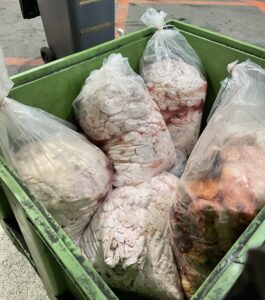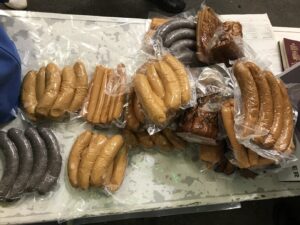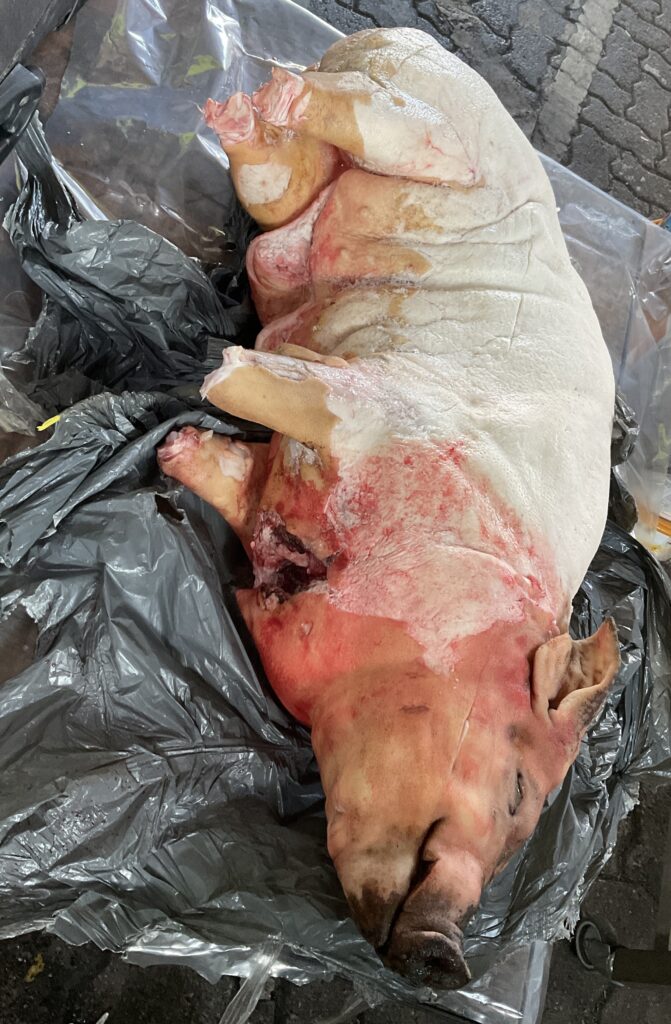Vast quantities of illegally imported meat are being seized by Dover Port Health Authority (DPHA) at the Port of Dover, with the authority fearing this could be just the ‘tip of the iceberg’.
The revelation comes against the backdrop of growing industry concerns over repeated delays in introducing official import controls on EU products of animal origin (POAO), with checks at ports not due to start until April 30, 2024.
In an article for the Chartered Institute of Environmental Health’s EHN magazine, Beverley Edmondson, Port Health Manager at Dover District Council and Port Health Authority, provided a revealing update, in the absence of these checks, on the port’s progress in implementing rules introduced in September 2022 to protect the UK pig herd from African swine fever (ASF).
The rules make it illegal for travellers to bring pork products weighing over 2kg into the country from the EU and European Free Trade Agreement state unless produced to EU commercial standards.
It is estimated 90% of this illicit trade enters the UK at Dover, and Ms Edmondson told Pig World that, working closely with Border Force, DPHA staff have seized more than 57 tonnes of illegal meat since the order came in, despite ‘limited resource’. This includes 5.5 tonnes of illegal meat seized over the weekend before Christmas, alone.
“Some of this was for personal consumption but, based on its presentation, it was predominantly destined for commercial use, which is extremely alarming. Although this is a significant quantity of illegal POAO, concerningly it is barely the tip of the iceberg,” she said.
“We are seeing unprecedented quantities of illegal, non-compliant meat, unparalleled at any other point of entry.”
Some of the meat arrives in commercial packaging, but without health marks, while other consignments are labelled to indicate they are from a restricted area affected by ASF and should be for the internal market only.

Discoveries include wheelie bins storing ‘piles of unwrapped and mixed raw and ready-to-eat food, through to bags of pigs’ anuses dripping blood liquor (and potentially worse) in direct contact with ready-to-eat, partially wrapped food products’.
Ms Edmondson’s highlighted the difficult nature of the work and said port staff had worked ‘tirelessly’ in ‘exceeding delivery expectations with the limited resources we have’, and stressed the need for the work to continue and be properly resourced.
“Our experiences over the last 12 months have highlighted the scale and scope of the illegal meat trade, and why our work to remove it from the food chain is so critical. We estimate that, for every tonne of illicit meat removed, there are multiple tonnes entering GB undetected,” she said.
She suggested the work should be placed under port health authority jurisdiction, rather than Border Force, for specific high-risk locations such as Dover’, and said it was ‘imperative resources are appropriately channelled and maintained to ensure we can keep this stuff out’.
Lucy Manzano, head of service for DPHA, added: “The risk at the Dover border, the UK’s pinch port for ASF controls has never been greater, and the work of Dover Port Health has never been more critical in tackling this risk for GB biosecurity, our farming communities and export trade.”
Border check delays
The NPA recently called on for action from Government on various fronts to prevent and prepare for an outbreak of ASF, including ensuring there are no further delays on checks for goods entering the UK from the EU and improving border controls for meat imports, for example sniffer dogs at ports, airports, Eurotunnel and postal hubs, alongside better communications.
NPA chief executive Lizzie Wilson said the revelations about the volumes of illegal meat being seized at Dover were ‘deeply worrying’.
“With ASF continuing to spread in Europe, often by human mediated routes, this highlights the very real risk to our national pig herd,” she said. “We have been calling on Government to ensure there are no further delays in introducing the Border TOM and to increase border controls for illegal meat imports as it is clear this vital work must be maintained and strengthened wherever possible.”
A Defra spokesperson said: “Preventing an outbreak of African Swine Fever is one of our key biosecurity priorities.
“We continue to work closely with Defra-funded Port Health Authority officers to enforce the new import controls which came into force last year to limit possible infected pig meat being brought into England.”
ASF risk
ASF continued to spread to new parts of Europe in 2023, often via what can only have been human-mediated spread.
The virus was discovered in wild boar in Sweden for the first time in September. How it got there was a mystery, but human spread was clearly to blame.
In May, ASF jumped to a new area of southern Italy in domestic pigs and wild boar, while tens of thousands of pigs were culled in outbreaks in the north of the country in the autumn.
There were major outbreaks in the Balkans countries, with various other EU countries reporting outbreaks in domestic pigs or wild boar, while the virus has been spreading in Asia, too, including new cases in Hong Kong, Vietnam and the Philippines.
The UK has never had a confirmed outbreak, but, as recent experience around the world has shown, it only takes one lapse for disaster to strike.
APHA has designated the risk of ASF entering Great Britain, from the human-mediated pathway as ‘HIGH’ (occurs very often), while the the overall risk of entry of ASF virus in live animals and products of animal origin (POAO) from affected countries, remains at ‘MEDIUM’ (occurs regularly).
A case study in the Government’s own document setting out details of its delayed Border Target Operating Model (TOM) highlights how the current lack of border checks has enabled meat products marked clearly as suitable only for sale in the originating country to reach shelves in up to 280 retail outlets.
“These goods would not have made it to the UK if Sanitary and Phytosanitary controls had been in place because they would not have been certified for export by a veterinarian in the originating country,” the document said.

This relates to the commercial trade. The introduction in September 2022 of the new rules governing non-commercial imports into GB, aimed at limiting possibly infected pig meat being brought into GB through, vehicles or passenger luggage, for example, is clearly making a difference.
There have been various reports of smaller volumes being seized at other ports, including, before Christmas, at Hull.
But the operation, particularly at Dover, where the work has been discussed in parliament, has also highlighted the extent of this trade – and the need for it to be properly resourced to prevent a potentially devastating outbreak of ASF in the UK.




